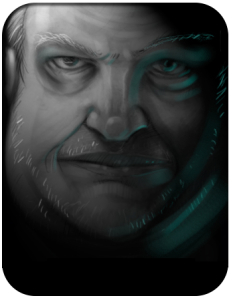DETECTIVE MOXLEY, Part 22: “Fire and Brimstone”
Sara Lindsey was already drawing her pistol when Detective Moxley told her to run. The thing that looked like Phillips lunged with its carving knife, but the detective was up, grabbing the silver serving tray in both hands. Her good china and the tea kettle crashed to the floor. Moxley cracked the serving tray across the Phillips-creature’s face. The sound was like a gong. Moxley was a big man and put his considerable weight behind the blow.
Phillips, or the creature that looked like him, fell to hands and knees, its head cocked at a bizarre angle. Valma’s impersonator stepped over its partner, raising the machete for a killing blow, headed straight for Moxley.
Put the front sight on the target, Lindsey told herself. Take a breath. Let half out. Squeeze the trigger—
The Makarov barked. Lindsey fired twice, then twice more. Explosive-cored rounds drilled through Valma’s face, knocking chunks from her skull and dislodging one eye. The mess that resulted was thick and slimy, without color. There was no blood.
Behind her, she could hear Moxley beating the Phillips-creature with the serving tray. She could not look. Valma had faltered, but now she raised the machete once more. Lindsey emptied the remaining rounds in her pistol’s magazine, dumping every shot into Valma’s ruined face.
Valma dropped to her knees. She scarcely had a head any more. The stalk of her neck was a shredded horror. The floor, and the Valma creature’s shoulders, were drenched in whatever goo these synthetic monsters contained. “Valma” waved her arms blindly in the air, her fingers clenching and releasing, clenching and releasing.
“Don’t,” said Moxley, “Go. Near. It.” Each word was punctuated by another furious blow with the serving tray. Moxley was hammering away at the Phillips impersonator’s head. He had caved it in, practically split it in two, and was chopping with the edge of the tray as one might with an axe. Phillips’ impersonator was now on its stomach, its legs twitching, its arms grabbing at the study’s ruined carpet.
Lindsey felt mildly nauseous. She looked down at her empty pistol, which she was still holding on the synthetic Valma’s body. She had no spare magazines for it. She could not remember the last time she had taken it to the shooting range.
Moxley appeared next to her. He was florid and sweating. He was also breathing hard enough that she feared he might have a heart attack then and there.
“Detective,” she said, placing the empty pistol on the seat of her damaged chair. “Now that we have thoroughly destroyed my study… are you well?”
“As well,” Moxley said, wheezing, “as… I’m going to be.” He slumped against the wall of the study, careful not to lean on any of the bookshelves built into the plaster. “They’re strong,” he said. “And they’re fast. But they’re not really much worse than a healthy person. Their heads. Their heads are soft. And there’s something weird about how they behave. It’s like this pair was holding back. I’ve seen them become much more aggressive. These two were much less difficult to kill than the last couple I tangled with.”
“So it would seem,” said Lindsey. “Should we call the authorities?”
“I shot one of them in the abdomen before,” said Moxley. He gestured to the revolver in his waistband. At Lindsey’s pointed glance, he said, “Oh. It’s empty. I don’t have any ammo. Don’t have money to buy any, either.”
“I imagine I could lend you some chits,” said Lindsey. “This is twice you’ve saved my life. It seems only fair. You were saying?”
“Shooting them in the torso doesn’t seem to help,” said Moxley. “Not unless you have a lot more firepower than a handgun. But the head. Must be where the main processor is, or whatever. I dunno. I’m not a technician.” He looked left, then right, scanning the room as if he were searching for something.
“What is it, Detective?”
“A hunch. If these two were holding back, there might have been a reason for it. Is there somewhere in this house big enough to hide a couple of bodies?” said Moxley. “Someplace you don’t often go. Not your walk-in bedroom closet, in other words.”
“Oh dear,” said Lindsey. “I suppose… The pantry, perhaps? That’s generally Valma’s domain, if it is anyone’s.”
“Show me,” said Moxley.
Lindsey led the detective to the kitchen, through the servant’s hallway leading from it, and to the door of the pantry. Moxley warned her off as they approached, so she stood well off and let him examine the door. When the big man was satisfied, he opened the louvered doors, very slowly.
Phillips and Valma lay inside. Moxley, with some difficulty, bent to put his fingers on their necks. Lindsey held her breath.
“Are they…?” she said.
“They’re alive,” said Moxley. “Possibly tranqed somehow. They’re deep under. I don’t see any marks or bruises. One of our synthoids in the study probably has an inducer or a syringe or something on its person. If you can call it a person.”
“I’ll call for a medical unit,” said Lindsey. “And while I’m at it, Detective, give me your coat. Your sleeve is soaked through with blood, not to mention ruined. I’ll put it in my printer and have it mended.”
“Thanks, Councilwoman.”
“I think we’re at the point of first names,” said Lindsey. “Call me Sara.”
“Harold.”
“You don’t look like a Harold,” said Lindsey. “What do people call you?”
“Mox.”
“That’s much more appropriate.”
* * *
Wearing his newly mended coat and with a pocket full of chits Lindsey insisted on “loaning” him, Moxley sank once more into the chair in the study. Lindsey perched on the edge of her own chair, sharing it with the empty gun. It would not belong before the authorities arrived for a follow-up investigation, but they had a few minutes. The initial incident reports had been filed by Goops. Medical first-responders had taken Phillips and Valma for examination and observation. The “dead” synthetics had been removed as well, but by government functionaries Lindsey had summoned for the purpose. Moxley did not ask where they synthoids were being taken. He figured he had one of his own; he could not begrudge Lindsey the same.
“Tell me, Mox,” said Lindsey. “Do you follow politics?”
“I try not to.”
“Then you probably don’t know that I have strong ties to the Medical Hegemony on the mainland.”
“Okay.”
“At present, the Hegemony bans experimentation on, and development toward, synthetic forms of artificial intelligence. I support this ban. So did Theopolis. So did other prominent Hongkongtown politicians who have been murdered in recent months. The official stance is driven by, as you might imagine, what the Hegemony considers the problem of Augmentation Sickness. ‘The plague of the modern world,’ I believe one prominent Human Services agent termed it. His paper on the issue caused quite a stir.”
“Right,” said Mox. “Anybody who crosses more than a third cybernetic implants is considered an Augment and thus sanctioned by Northam Law.”
“Precisely,” said Lindsey. “The ban on synthetic forms of life is intended to prevent a further worsening of the Augment problem. We are supposed to be concerned that the Augments will begin manufacturing themselves. That they will produce an army of synthetic compatriots and swamp the world in their numbers.”
“Anarchy,” said Moxley. “Toads falling from the sky. Fire and brimstone.”
“Yes,” said Lindsey. “I am a medical doctor. I am fully credentialed through the Hegemony. But I don’t support the ban because I fear the Augments. Quite the contrary. I think the percentage laws are too strict, and I would like to see Augmented citizens restored to full rights within our society. I think the stigma associated with Augmentation Sickness — even the emotionally loaded name for this drive, this compulsion — prevents us from properly investigating it. I would like to see honest, objective research conducted.”
“Then I don’t get it,” said Moxley. “Why don’t you fight the ban, if you’re not an Og-hater?”
“Please, Detective,” said Lindsey. “That’s such an impolite term.”
“Sorry.”
“To answer your question, the Hegemony’s ban isn’t just a bid for medical control, though that’s what undergirds it,” she said. “The ban prevents corporations like BDM and Caricara Pharmaceutical from exploiting the Augments, from weaponizing them. If we allow the likes of BDM to develop synthetic consciousness, it’s only a matter of time before they’re creating travesties of living beings that are neither augmented humans nor fully artificial constructs like robots. Imagine the public panic that would ensue of word got out that such creatures were being created. It would harm the cause of Augment rights, not help it… and these synthoids, as you call them, these things that can imitate people we know, they are precisely what the ban was intended to contraindicate.”
“That’s not good.”
“No,” said Lindsey. “It most definitely is not. Have I told you what you came to learn?”
“I’d say you have,” said Mox. “And, uh, thank you. For everything.”
“Thank you, Detective. Mox. Please be careful. And if you need anything, I think I still owe you a favor or two before I consider us even.”
“I’ll keep that in mind, ma’am. Uh, Sara.”
The big man excused himself and left. Lindsey went back to the study, touched a concealed stud on one of the bookshelves, and waited for the facade to retract. Beneath the artfully arranged book bindings was a full computing and communications kiosk. From its multiple screens she watched as Moxley drove off her property, piloting what had to be the sorriest ground car she had seen in years. She shook her head.
Keying a sequence from memory into the communications terminal, she waited for a few moments before the screen came alive. The young blonde girl who appeared was barely a teenager, perhaps still a preteen. She was lovely.
“Councilwoman Lindsey,” said the girl.
“You were right,” said Lindsey. “Detective Moxley was here. I’m transmitting you the frequency of the tracking device in the liner of his coat.”
The girl’s eyes went to a different area of the screen as she read and, if Lindsey’s suspicions were correct, immediately memorized the numbers. “Thank you,” she said.
“There’s more,” said Lindsey. “One of the big private medical firms is moving ahead with the development of the types of synthetics we feared they might. They’re using them as assassins. Evidently the synthetic beings can imitate other people, even fool DNA and identity scans.”
“That could be very damaging to our cause.”
“Yes,” said Lindsey. “Although I believe I’ve set Moxley in the right direction. You’re certain you don’t want me to give him more active assistance?”
“We have experience with Detective Moxley,” said the girl. “He should be up to the task. I’ll make sure.”
“Do you require more resources from me?”
“No,” said the young blonde. “I have Chance, Julian, and Gabriel stationed in Hongkongtown should I need them. We’ll see to it, don’t worry. And Councilwoman? Please take measures to protect yourself. I have faith in Detective Moxley, but he’s only one man.”
“Thank you, Aria,” said Lindsey. “I will. I’ll let you know if I learn more.”
The blonde girl nodded. The screen went dark.
Councilwoman Sara Lindsey suddenly felt very tired.


